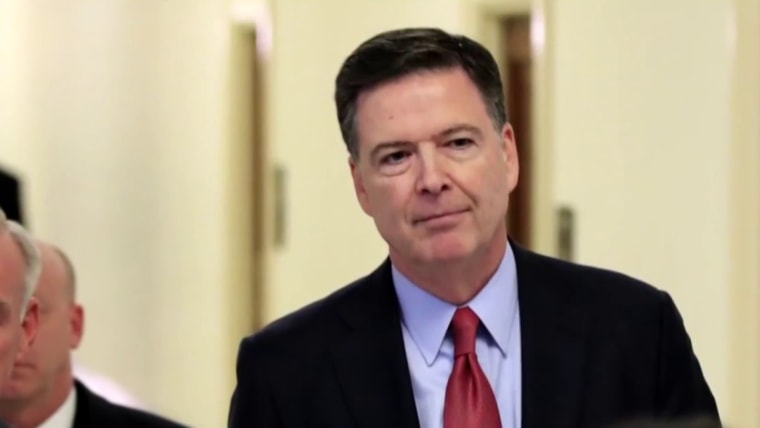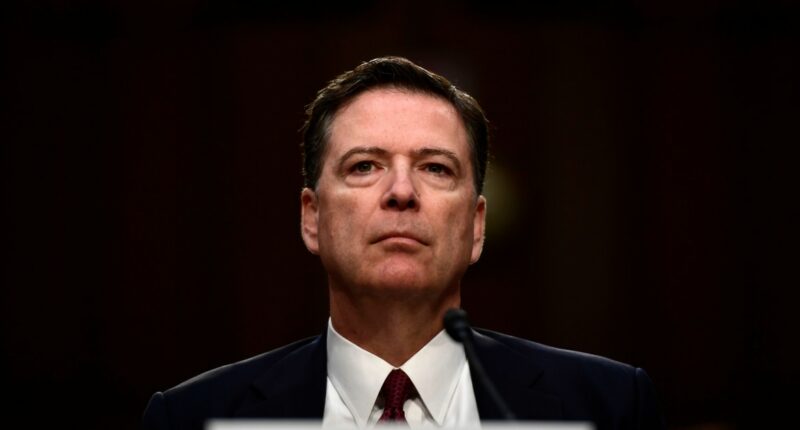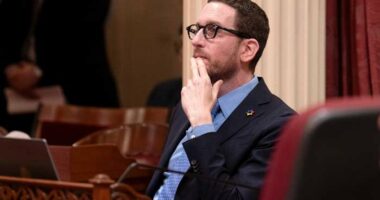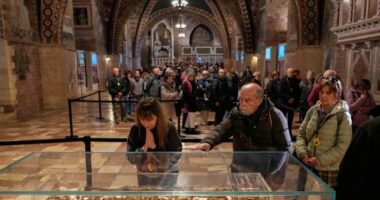Share this @internewscast.com
On Thursday, former FBI Director James Comey was indicted shortly after President Donald Trump urged U.S. Attorney General Pam Bondi to take legal action against him and two other political opponents.
The indictment includes two counts: making a false statement and obstruction of a congressional proceeding.
Prior to its release, Bondi shared a social media statement declaring the indictment as evidence of the Department of Justice’s dedication to ensuring those who misuse power are held responsible for deceiving the public. Comey was not explicitly mentioned in the statement.
Comey did not immediately respond to a request for comment.
The charges relate to Comey’s testimony on September 30, 2020, during a Senate Judiciary Committee hearing. In response to Sen. Ted Cruz, R-Texas, who questioned Comey about his 2017 testimony concerning unauthorized leaks on FBI investigations into then-President Trump and former Secretary of State Hillary Clinton, Comey confirmed, “I stand by the testimony.”
Comey’s deputy, Andrew McCabe, indicated that Comey had authorized him to release information to the media, based on a 2018 Justice Department inspector general report, which also highlighted that McCabe provided several inaccurate or misleading statements.
The statute of limitations for the charges was set to expire Tuesday. Comey could face a maximum of five years in prison if he is convicted.
Trump has undone reforms established post-Watergate that prohibited presidents from instructing the Justice Department to prosecute their adversaries. For half a century, Republican and Democratic presidents have allowed Justice Department officials to determine prosecution needs.
During his second term, Trump appointed several personal defense lawyers to senior DOJ roles, granted pardons to over 1,000 individuals implicated in the Jan. 6 incident, and openly pressured Attorney General Pam Bondi to investigate his adversaries.
Lindsey Halligan, the new acting U.S. attorney for the Eastern District of Virginia, brought the charges against Comey despite concerns from prosecutors within her department.
“The charges as alleged in this case represent a breach of the public trust at an extraordinary level,” Halligan said in a statement Thursday.
Prior to the charges, a senior Justice Department official told NBC News that career prosecutors in Halligan’s office sent her a memo documenting why they believed that probable cause did not exist to secure an indictment against Comey.

In a Sept. 20 social media post addressed to Bondi, Trump pressed her on Comey and other prominent critics, Sen. am Schiff, D-Calif., and New York Attorney General Letitia James.
“We can’t delay any longer, it’s killing our reputation and credibility. They impeached me twice, and indicted me (5 times!), OVER NOTHING. JUSTICE MUST BE SERVED, NOW!!!” Trump wrote.
Trump doubled down on his comments later that day, telling reporters, “If they’re not guilty, that’s fine. If they are guilty, or if they should be judged, they should be judged. And we have to do it now.”
Trump appointed Halligan, who represented him during his classified documents case, after expressing frustration that her predecessor, acting U.S. Attorney Erik S. Siebert, had not brought fraud charges against James.
Asked on Thursday about a potential indictment of Comey, Trump said he believed he could “get involved” if he wanted to and that the former FBI director is a “bad person.”
“I think I’d be allowed to get involved if I want, but I don’t really choose to do so,” Trump added. “I can only say that Comey is a bad person. He’s a sick person.”
Comey has been in the president’s crosshairs since the FBI, under Comey’s direction, launched an investigation into Russian election interference in the 2016 presidential race and potential ties to the Trump campaign. After Trump’s first inauguration, he and Comey clashed privately over the investigation, according to testimony Comey gave to Congress in 2017 and his 2018 memoir.
Comey was fired in May 2017, leading then-Attorney General Jeff Sessions to appoint Robert Mueller to take over the Russia probe.
Comey emerged as a prominent Trump critic after his firing, calling the president an “unethical” man who was “untethered to truth” in the 2018 book, “A Higher Loyalty: Truth, Lies and Leadership.”
During Trump’s first term, the president directed then-special counsel John Durham to investigate the origins of the Russia investigation. Durham’s team did not charge Comey with a crime.
FBI Director Kash Patel said in a statement posted on social media Thursday that the bureau was looking to reverse “weaponized federal law enforcement” from past “corrupt leadership.”
“Nowhere was this politicization of law enforcement more blatant than during the Russiagate hoax, a disgraceful chapter in history we continue to investigate and expose,” Patel wrote.
The Department of Homeland Security and the Secret Service also investigated Comey earlier this year over a photo showing shells on a beach formed into the numbers “86 47” that he posted on social media in May, which some U.S. officials viewed as calling for Trump’s assassination.
Comey said during an MSNBC interview after the incident that he hadn’t envisioned the post would cause controversy, and warned about “the use of power to aim at individuals, eroding the rule of law.”










